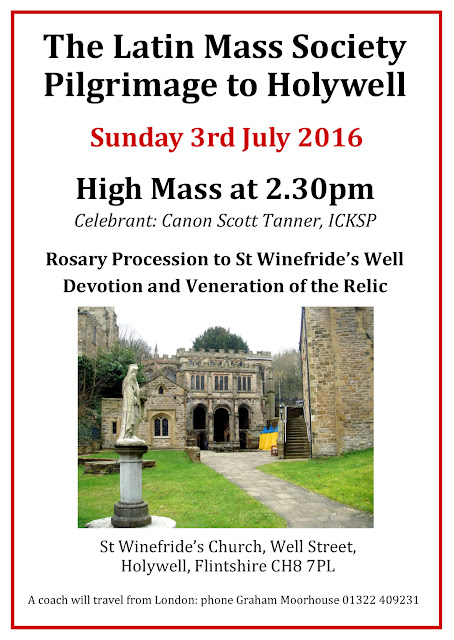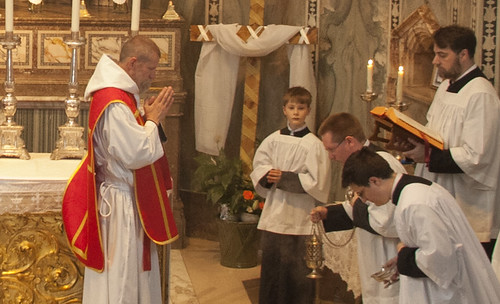Chairman's Blog
What sort of Mass did 'Vatican II' want?
| The Traditional Mass on the Chatres Pilgrimage. Not as off-putting to young people as Pope Paul VI imagined. Photo by John Aron. |
Liturgical conservatives and progressives argue endlessly about this. Their argument will never be resolved, both because Sacrosanctum Concilium was and the subsequent magisterium has been self-contradictory, but also because neither side in the debate is willing to be honest about the historical facts. I am sorry to be harsh, but having read the output of both sides of the debate over a number of years, it is time it was said.
First, Sacrosantum Concilium: how is it self-contradictory? It makes few concrete suggestions, but it does make some. It calls for wider use of the vernacular (63); the removal of 'useless repetition' (34), and a more 'lavish' presentation of the Scriptures in the readings, arranged 'prescribed number of years' (51). It leaves further details to local initiative and an official commission. On the other hand, it says (23)
there must be no innovations unless the good of the Church genuinely and certainly requires them; and care must be taken that any new forms adopted should in some way grow organically from forms already existing.
It is perfectly obvious that the this double condition is not satisfied by the concrete suggestions the document itself makes. There is no precedent in the liturgical tradition of the Church, in any Rite, for a multi-year lectionary, and to suggest that such a thing could grow 'organically' out of a single-year lectionary is obviously absurd. There is no precedent for a mixing of Latin and the vernacular in the liturgy, or for the liturgy to be translated into dozens of vernaculars for different countries. The principle militating against 'useless repetition' is entirely foreign to the Church's liturgical tradition. And none of these changes could possibly, in advance, be said to be required 'genuinely and certainly' by the good of the Church.
From this fundamental self-contradiction, you can draw any conclusion you like. Perhaps the 'general principle' of section 23 should control our interpretation of the specific examples of reforms; perhaps it is the other other way around. The fact is, there is no coherent programme of reform in Sacrosanctum Concilium. Let's not engage in make-believe. It is a compromise document with provisions pointing in different directions.
It was, however, interpreted by those appointed to interpret it, and the Novus Ordo Missae was signed off by Pope Paul VI. So what liturgical style are we guided towards by the official documents, documents of the 'living magisterium' as the conservatives like to call them, which accompanied and followed the promulgation of the new missal?
Well, these documents too are mutually contradictory. The architect of the reforms, Archbishop Annibale Bugnini, made a great deal of the provision of Sacrosanctum Conciium 34:
The rites should be distinguished by a noble simplicity; they should be short, clear, and unencumbered by useless repetitions; they should be within the people's powers of comprehension, and normally should not require much explanation.
This is his justification for rewriting practically every Latin prayer in the Missal, and then authorising its translation into kindergarten English: projects which were, of course, officially approved and given authoritative promulgation by the Church's Supreme Legislator, the Pope. Where does the 2011 'new translation' come from? It comes from a much later document, the 2001 Instruction Liturgiam authenticam which states (27):
|
If indeed, in the liturgical texts, words or expressions are sometimes employed which differ somewhat from usual and everyday speech, it is often enough by virtue of this very fact that the texts become truly memorable and capable of expressing heavenly realities.
|
The fact has to be faced: in proposing a 'hieratic', 'sacred' liturgical register, it introduces a liturgical principle for the guidance of translators which simply is not to be found in Sacrosanctum Concilium or in the numerous documents of the 1970s and 1980s, documents like the toe-curling Directory for Masses with Children in 1973. There had been a massive conservative push-back in the 1990s and Liturgicam authenticam was the result. So patent was the contradiction between the two eras that Liturgicam authenticaum actually abrogated a whole raft of official guidance from before 1994:
|
8. The norms set forth in this Instruction are to be substituted for all norms previously published on the matter,
|
We need to face the fact: the magisterium's own interpretation of Sacrosanctum Concilium is a moving target. It was quite different in the 1970s than it was by the mid 1990s. Who knows where it will be in ten years?
Let me give a couple more examples: on the use of Latin and on Gregorian Chant.
Latin: for. Sacroscantum Concilium
36. 1. Particular law remaining in force, the use of the Latin language is to be preserved in the Latin rites.
101. 1. In accordance with the centuries-old tradition of the Latin rite, the Latin language is to be retained by clerics in the divine office.
Pope John Paul II: Dominicae Cenae (1980) 10:
[Latin is] an expression of the unity of the Church and through its dignified character [it] elicited a profound sense of the Eucharistic Mystery. ...The Roman Church has special obligations towards Latin, the splendid language of ancient Rome, and she must manifest them whenever the occasion presents itself.
Instruction Ratio fundamentalis institutionis sacerdotalis (1980):
the Council is far from having banned the use of the Latin language. Indeed, it did the contrary. Thus the systematic exclusion of Latin is an abuse no less to be condemned than the systematic desire of some people to use it exclusively. Its sudden and total disappearance will not be without serious pastoral consequences.
Latin: against. Pope Paul VI, Nov 26 1969
No longer Latin, but the spoken language will be the principal language of the Mass.
If the divine Latin language kept us apart from the children, from youth, from the world of labor and of affairs, if it were a dark screen, not a clear window, would it be right for us fishers of souls to maintain it as the exclusive language of prayer and religious intercourse?
Dozens of official references to the allegedly beneficial effect of putting the liturgy in the vernacular, as something done by the Council, could be cited.
Chant: for. Sacrosanctum Concilium
116. The Church acknowledges Gregorian chant as specially suited to the Roman liturgy: therefore, other things being equal, it should be given pride of place in liturgical services.
Pope Paul VI: Sacrificium laudis 1966 (to religious superiors)
One can also wonder whether men would come in such numbers to your churches in quest of the sacred prayer, if its ancient and native tongue, joined to a chant full of grave beauty, resounded no more within your walls.
Paul VI Voluntati Obsequens 1974
... the liturgical reform does not and indeed cannot deny the past. Rather does it "preserve and foster it with the greatest care." It cultivates and transmits all that is in it of high religious, cultural and artistic worth and especially those elements which can express even externally the unity of believers.
Chant: against. Pope Paul VI, Nov 26 1969:
We will lose a great part of that stupendous and incomparable artistic and spiritual thing, the Gregorian chant.
Instruction Concerts in Churches 1987:
There is a way of reading these documents which minimises the tension, for example by saying that Latin and Chant be used in a few places, but not for 'most' of the Mass: Paul VI mentions the singing of the Creed and the Our Father. But the attitudes underlying these documents make perfectly reasonable the more extensive application pushed by conservatives and progressives, in opposite directions.
If Latin and Chant are powerful and profound, if they exemplify unity and foster vocations, and if the reform was not about breaking with the past but 'fostering' our traditions, why not have Latin propers chanted, and why not have the Canon, or indeed the whole of Mass, in Latin?
On the other hand, if participation requires comprehension without, usually, any explanation, and if the former liturgical practice failed to appreciate this - if it was like a 'dark screen' - then Latin and Chant have no place in the Mass at all.
Those seeking, in Conciliar and post-conciliar documents, guidance on liturgical principles, with a view to the way Mass should be celebrated, and perhaps with a view to future reform, should stop right here. There is no single, coherent, vision of the liturgy in these documents. There is, instead, a debate. In the end, one side of this debate must win, and the other side must lose.
I would like to appeal to the 'reform of the reform' writers, and to the progressives on Pray Tell and elsewhere: stop accusing each other (and traditional Catholics) of contradicting authoritative documents and the 'real' principles of Vatican II. On this subject, arguments from authority will get us nowhere.
The only way to think with the Church on the liturgy is to take a longer view: to look at what the Church has done, not over a few decades, but over millennia. The very idea of doing this, of course, contradicts the claim that everything up to 1965 was bad. But it is that idea, rather than an honest appraisal of the modern liturgical documents considered here, that is really troubling for the doctrine of the indefectability of the Church. If the Church was wrong up to 1965, why pay any attention to what she has said since then?
Support the work of the LMS by becoming an 'Anniversary Supporter'.
The OF and the EF: how they are related
Today I repost this from 2013, partly in response to two things which I saw on social media, from conservative Catholics about the Novus Ordo. Here, Fr Richard Heilman wishes that the Ordinary Form be celerbated like 'the actual Mass of Vatican II'. This turns out to be a reference to the 1965 liturgical books, which may have been celebrated during the latter part of the Council, but certainly isn't what the Council wanted the Mass to be like. Here, John Allen quotes a priest praising the new translation because it faithfully renders the Latin prayers, 'considering the antiquity and universal usage of these prayers'. But very few ancient Latin prayers survived unscathed into the Novus Ordo.
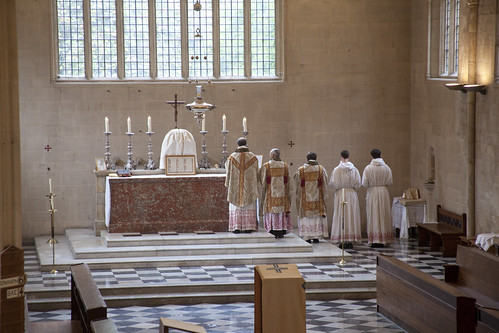 |
| Dominican Rite: lining up side by side, not, as with the Roman Rite, one behind the other. |
I've received a comment on my last post:
'Joseph, for the benefit of readers, could you list some of those features which the Novus Ordo lacks -- "features ... so centrally characteristic of the Roman Rite that anything lacking them has to be categorised as something else"? I'd like to hear the features that strike you as characteristic in such a way that the two forms would be divided by having or lacking them.'
This is a fair question, and I didn't address it the other day only for reasons of space. Here is a nice reply by the liturgical scholar and Latinist Philip Goddard, in a letter in the Catholic Herald from a couple of years ago (29 April 2011):
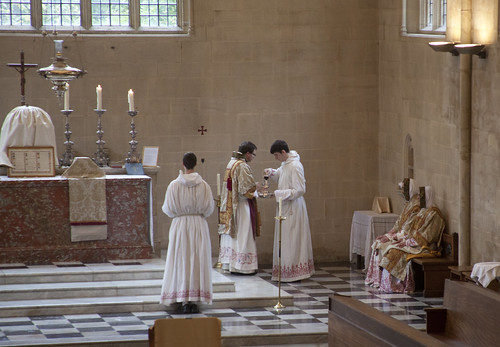 |
| Water and wine added to the Chalice (at High Mass) during the Gradual and Alleluia, not at the Offertory. |
'Although I agree with much of what Fr Leo Chamberlain says (Letter, April 1), especially about the the effects of relativism on religious faith and practice, I do not see how he can seriously maintain that the new Roman rite is in accordance with tradition.
In the Roman tradition Mass is celebrated in Latin: in the New rite it is normally in the vernacular. In the Roman tradition the celebrant faces East: in the New rite he almost always faces versus populum. In the Roman tradition there is a single annual cycle of readings: in the New rite there is a triennial cycle. In the Roman tradition the non-Gospel readings are recited or sung by an ordained minister; in the New rite they are recited by a layman. In the Roman tradition there is a single Eucharistic Prayer; in the New rite there are many. In the Roman tradition Holy Communion is received kneeling, on the tongue, from an ordained minister; in the New rite is it generally revived under both kinds, standing, in the hand, and often from a lay minister. In the Roman tradition the service of the altar is restricted to males; in the New rite it is open to both sexes. One could go on and on listing the differences, if space permitted.
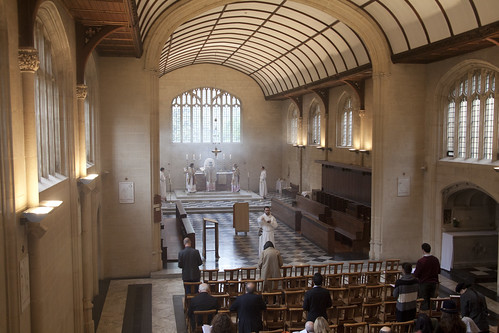 |
| Thurible raised and lowered, not swung. |
No doubt Fr Chamberlain would argue that some, or even all, of these innovations are beneficial. That is as may be. Traditional, however, they are not.'
(There's more about this correspondence with Fr Chamberlain, in which I was also involved, here.)
It is sometimes said that continuity is preserved in part because many of the innovations listed are not obligatory. It is possible to celebrate the Novus Ordo entirely in Latin, with male servers, ordained readers, and the like. But comparing rites is a matter of comparing the body of rubrics, texts, and rules, and common practice, and those rubrics, texts, and rules, and the common practice, are radically different. It is would be absurd to deny that the Mozarabic Rite was a separate Rite because, under some options under some peculiar liturgical circumstances, it can be said in a way quite similar to the Roman Rite under another set of options and peculiar circumstances. It is different because of the differences.
 |
| The Kiss of Peace administered using a 'paxbrede', not an embrace. |
And of course the very fact that there are all these options is another radical break with the tradition of the Roman Rite. The priest can never choose between languages, Eucharistic Prayers, Prefaces, or readings, in the Roman liturgical tradition. This is an extremely important part of that tradition, which is essential to the character of the Traditional Mass as something given to us by the Church, not thought up on the spot by a liturgy committee.
Finally, when saying they are different one should bear in mind the kinds of differences which as a matter of course justify scholars in saying that the Byzantine and the Maronite Rites, or whatever, are different Rites. Obviously they are all rites of Mass. Obviously they all have important features in common - the features common to all rites of Mass, or to many of them. The differences may even seem subtle, if you leave the language of the Mass aside. There are re-arrangements of some elements (when i the Pax takes place, for example); some things are added in one and excluded from another. They are all good and pious rites of Mass, they are just different.
The Novus Ordo, it has often been pointed out, is more different from the 1962 Mass than the latter is from a number of Rites which are nevertheless agreed to separate Rites.
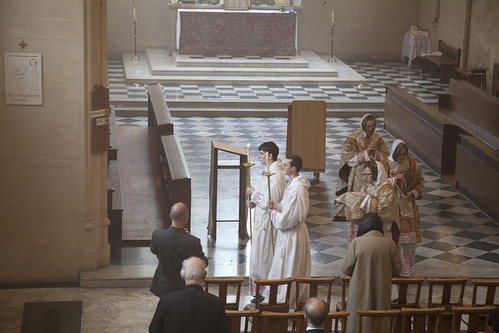 |
| Hoods raised processing in and out. |
I am of course very familiar with the argument in favour of continuity, and the people making it are often doing so for noble reasons. We must remember, however, that the greatest exponent of the 'hermeneutic of continuity', Pope Benedict XVI, was also the man who did more than anyone to make the reality of the liturgical rupture part of the respectable debate. The hermeneutic of continuity is not about denying the fact of change before our eyes; it is about accepting the tradition stretching into the past as a living part of the Church's patrimony, which conditions how we understand the teaching of the Second Vatican Council, and indeed the rest of our experience.
Photos: High Mass in the Dominican Rite. The question of whether the Dominican Rite and the Roman Rite are really separate Rites, or whether the former is a 'Use' of the latter, is debated, on historical grounds: where did the Dominican Rite come from? But these are the kinds of differences which are significant between one Western Rite and another.
Loftus attacks Archbishop Sample: on chant and children
Further to my recent posts about Montessori and children, I'm reposting this from 2014. I've not been keeping up my review of Mgr Basil Loftus output recently, but whenever I look at his columns I see that they make just as much sense as they ever did.
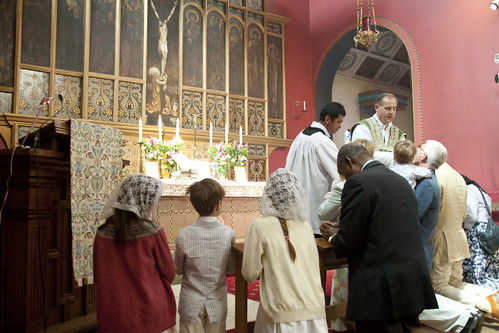 |
| Children at St Mary Magdalen, Wandsworth, a Mass with Chant propers and polyphonic Ordinary. |
Every now and then Mgr Basil Loftus makes reference to singing in Mass. It appears to be one of his many obsessions. A classic was his suggestion that when the General Instruction recommends a chant or song at Communion, this rules out adherence to the Instruction Redemptionis Sacramentum's requirement that the Communion Plate be used, and the recommendation in that instruction, now a requirement of our own Bishops' Conference, that the Faithful make an 'act of reverence' before receiving Communion, because of the difficulty of multi-tasking...
It is not surprising, therefore, that when he turns his attention to chant and hymns he comes out with the usual muddle and deliberately misleading claims.
He starts by quoting Archbishop Sample of Portland, Oregon:
'It is clear that the Council calls for the liturgy to be sung. In recent decades we've adopted the practice of singing songs at Mass. We take the Mass and attach four songs or hymns to it. But this is not the Church's vision. We need to sing the Mass. It is meant to be sung. The texts of the Mass are meant to be sung.'
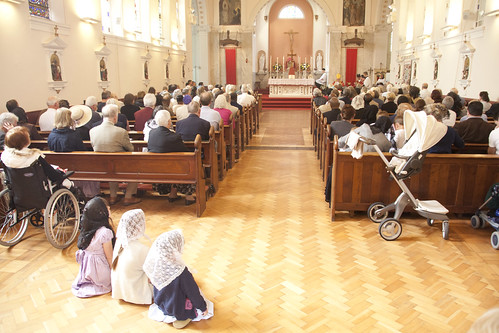 |
| Children at the LMS Pilgrimage to Holywell. |
Loftus' comment on this typifies his disregard for making sense, as well as good manners or respect for his superiors:
The archbishop's observation, while very helpful, is also both simplistic and deceptive.
Was it a subeditor who added the phrase 'very helpful'? Or is Loftus able to hold two incompatible judgments in his head at the same time?
His reason for saying that Archbishop Sample is being 'simplistic and deceptive' is that he cannot get his mind around the very simple point that the Archbishop is making: that when hymns are sung, in the Novus Ordo, they are sung instead of the singing of a liturgical text. The General Instruction says: you can sing the Introit chant, or something else. Later on, you can sing the Offertory chant, or something else. At Communion, you can sing the Communion chant, or something else. If, each time, you find yourself singing a hymn, you are doing so at the expense of singing the chant texts set for the day.
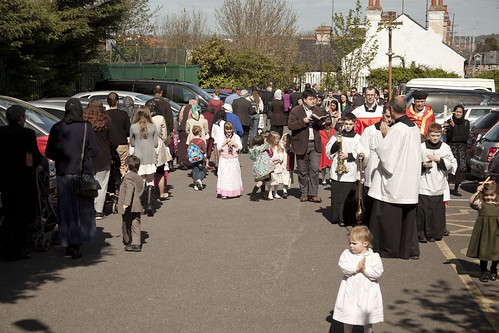 |
| Ok, so she's not in exactly the right place, but she's doing her best... Palm Sunday with the FSSP in Reading. |
Of course, the wider legal and textual situation in the Novus Ordo is a nightmare of confusion and mixed signals, which I have addressed, a little, here. Nevertheless, Archbishop Sample is right that by replacing the chants with hymns, we are moving from a liturgical text - an ancient, Catholic, liturgical text, in fact - to something which is at best para-liturgical, and often not even Catholic.
Loftus' argument against the use of the liturgical texts is the typically patronising argument that chant is not appropriate for ordinary people in ordinary Masses.
The aura, ethos and culture of a monastic Mass cannot easily by transplanted in a parish Sunday Mass. Nor is it always appropriate to try to do so. Not many abbots presiding at conventual Mass in their monasteries have the ethereal, numinous and meditative qualities of their organ-led Greogorian-chant shattered by a four-year-old returning from the children's liturgy and informing him: "I want to wee."
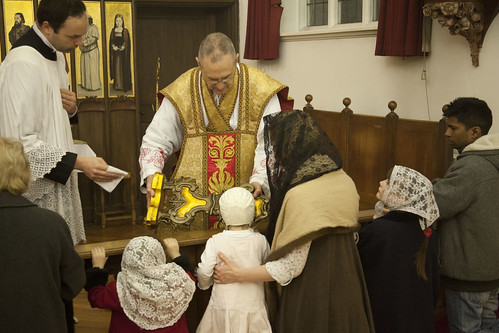 |
| Venerating a relic of St Gregory the Great, the codifier of the Chant repertoire, at SS Gregory & Augustine in Oxford. |
Has Loftus ever actually seen a Mass with chant being sung with a congregation with lots of small children? Anyone tempted by his line of argument urgently needs to get themselves to the regular, sung Traditional Mass celebrated in places such as Reading, by the Fraternity of St Peter, St Bede's, Clapham Park, or Blackfen. I have taken my children, who range from six months to ten years of age, to such Masses all their lives, and I have myself sung, yes sung chant, at the great majority of those Masses, in a large number of locations with fellow worshipers from every corner of the land and every walk of life, so unlike Basil I know exactly what I am talking about. The reality is that children respond to the atmosphere created by chant at least as much, and I would say actually more, than adults.
The atmosphere created by chant is at least in part a matter of association: that is to say, it is learnt. To compare like with like, therefore - adults and children equally unfamiliar with chant - then small children are at a huge advantage, because they learn fast, they have no preconceptions, and they are imitative. They want to do what other people are doing.
When the association is embedded, in children and adults, again if we are comparing like with like, then children again have a big advantage, because - as anyone who knows children knows - children are conservative. Once a habit is established, the way the Christmas tree is decorated or the table is laid, children naturally stick fast to it. Once they've learnt that chant accompanies an activity for which they need to be quiet, they will be very resistant to anything contradicting this principle.
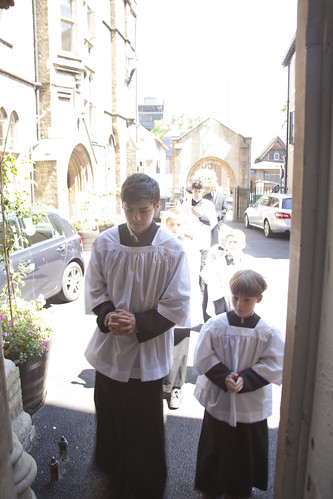 |
| Servers at a funeral in the Oxford Oratory. |
I suppose Loftus may have in mind an unfair comparison, between adults who have a dim recollection of chant as associated with the sacred, coupled with a vague sense of duty about how to behave in church, and children whose liturgical instincts have been un-formed as a result of infrequent visits to church, and mis-formed by hyper-active 'kiddies hymns' and 'children's liturgies'. If children behave inappropriately for those reasons, however, it is the grown-ups who are to blame.
What the four-year-old of Loftus' fantasy needs, then, after his visit to the loo, is an end to the 'children's liturgy', and consistent exposure to chant, ideally at the Traditional Mass. If he observes other people lower their voices in church, with a little encouragement he will do the same. Small boys can be more prone to restlessness in church than girls, but wait a couple more years and he'll be joining the serving team, and your problems are over.
Obviously, this is not going to happen if there are girls serving. But that's just reason number 94 for making sure it is the Traditional Mass.
There are many other errors in the article, but as usual I can't address them all. For example, the Gloria is not a hymn in any usefully descriptive sense: it is not metrical. Like the Psalms, it can be sung using Gregorian Chant because this can cope with texts which don't have strict dum-di-dum rythms and lines of equal length. (It is called a 'prose'.) Metrical hymns have a very long history in the Roman liturgy, in the Office, but never - never - in Mass, until vernacular hymns crept in as a result of Protestant influence.
 Noting that the Vatican II document on the liturgy, Sacrosanctum Concilium, allows a range of musical instruments to be used in the liturgy, Loftus writes:
Noting that the Vatican II document on the liturgy, Sacrosanctum Concilium, allows a range of musical instruments to be used in the liturgy, Loftus writes:
If the bagpipes is the chosen instrument, then the type of music must be tailored to it. This may exclude Gregorian chant.
A bizarre attempt to put the cart before the horse: to claim the right to choose the instrument and then fit the music to it, regardless of liturgical considerations. However, it is not a well chosen example. I learned on the Chartres Pilgrimage that it is perfectly possible - strange, perhaps, but perfectly possible - to play chant melodies on the bagpipes, from the chap in the picture.
As a service to the public, I have put together quotations on a range of themes from Loftus' published writings, mostly his Catholic Times columns, in a dossier here, and made one of his most theologically egregious articles, on the Resurrection of Our Lord, available here.
Support the work of the LMS by becoming an 'Anniversary Supporter'.
About blogging on this blog
 |
| St Jerome in his study. |
I need to free up some time for an academic project, so I am going to take a bit of a step back from this blog for a few months. The most-read posts - such as the ones over the last few days on Montessori and clericalism - are very time-consuming to write. I don't regret using my time in this way, as it has proved very valuable to me in developing my thinking, with the aid of reactions and comments, but I need to take a break from that for a few months.
I'll continue to post announcements and some topical material. What I propose to do to replace the posts I've been doing on liturgical and theological issues - which are the ones, as I say, which generate a relatively big readership - is selectively to re-post material already published on this blog. I hope that doesn't seem like cheating! If so, I apologise in advance.
I will fairly soon be able to post on a brand new Position Paper, however, on the Extraordinary Form and the Laity.
Support the work of the LMS by becoming an 'Anniversary Supporter'.
LMS Pilgrimage to Holywell: Sunday 3rd July
Come and visit the only shrine in England and Wales which survived the destruction of the Protestant Revolt: the beautiful healing well of St Winefride in North Wales.
It's not as difficult to get there as you might think! From the south, north, and East there are motorways which take you to Chester, and an excellent main road takes you the rest of the way. Click for a map. There is even a coach from London- see the poster.
Note that unusually among LMS pilgrimages, this event is (as always) on a Sunday. The celebrant is the young English priest of the Institute of Christ the King Sovereign Priest, Fr Scot Tanner.
As well as High Mass there is a procession to the well and veneration of St Winefride's relic.
Support the work of the LMS by becoming an 'Anniversary Supporter'.
Montessori and the Directory for Masses with Children
Continuing from the discussion in this post, we may ask the question: What happens if you start out with the idea that children need to be constantly doing or saying things in Mass, and need to understand everything they hear immediately?
You get the nightmare scenario experienced already in the early 20th century, which Maria Montessori describes: over zealous pedagogues influenced by the Liturgical Movement turning the Mass into a classroom. (The Mass Explained to Children p3)
Some lay masters lead files of children into church, rapping out orders to them like a corporal to a squad of new recruits: "Kneel down! No, not like that, all together!" Or one sees a teaching actually taking the children by the shoulders and planing them one by one in the benches, just as if she were packing fruit into baskets.
Another obvious mistake is to teach them during the Mass.
...Even at the Consecration, during those moments of silence and recollection, one hears the voice of the zealous teacher raised...
The problem is, as I noted in the previous post in this series, that Montessori herself contributed to this approach by her emphasis on 'synthetic activity' as the key to learning, in The Child in the Church and other works. When it came to concrete suggestions, she was tremendously enthusiastic about a scheme, put into practice at one of her schools, for children to grow the wheat and vines to be used for the Sacred Species in Mass. Activities in Mass itself would include kneeling and standing up, making the sign of the cross, wandering about with lighted candles and flowers for statues, and carrying up the gifts at the Offertory. Quite how these activities could be appropriately facilitated without the teaching during Mass she abhorred is, sadly, not explained. But the editor of the 1965 edition cheerfully chips in with the possibility of children placing the hosts in the ciborium, and being better able to understand because, as well as the use of the vernacular, 'they see altars more closely approximating real tables.'
Eh? Why is seeing the altar look more like a table going to help children understand what is happening at Mass? Only, I suppose, if the sacrificial nature of the Mass - emphasised by Montessori in The Mass Explained to Children - is ignored. But there is something in common between this strange suggestion and Montessori's own, which is drawn out in the 1973 Directory for Masses with Children, produced by the Congregation for Divine Worship.
...even if children already have some feeling for God and the things of God, they may also experience in proportion to their age and personal development the human values that are present in the Eucharistic Celebration. These values include the community activity, exchange of greetings, capacity to listen and to seek and grant pardon, expression of gratitude, experience of symbolic actions, a meal of friendship, and festive celebration.
Eucharistic catechesis... should develop such human values. Then, depending on their age and their psychological and social situation, children will gradually open their minds to the perception of Christian values and the celebration of the mystery of Christ.
This is it, isn't it? Seeing the Mass first as a 'shared meal' is not just about denying its sacrificial nature. There is another aspect of it, which it shares with the fuss made about growing the wheat for the hosts, putting flowers in front of Our Lady, and, after the reform, shaking hands and the like. They represent 'human values': by which they mean natural, as opposed to supernatural, values: secular, everyday, values.
I have pointed out in relation to the question of the Kiss of Peace that in the liturgical tradition it is the Peace of Christ, radiating out from the Consecrated Host on the Altar, which is passed on by the celebrant in a beautiful way in traditional High Mass, whereas simultaneous handshakes fail completely to convey that reality. This Directory is the first official document I've seen which more or less explicitly regards that as a good thing. The handshake should be seen, first, at a prosaic human level: it should first and foremost indicate natural human greetings and friendship. Only then, much later, after years of seeing the Mass as something principally prosaic and banal, like a Registry Office wedding, a humanist funeral, or a ceremony at a Masonic lodge, then, in some utterly mysterious way, 'children will gradually open their eyes' to what has been in large part deliberately hidden from them, even when they had a 'feeling for God' which has in the meantime been starved: the 'Christian values' involved, the 'mystery of Christ'.
The danger, of course, is that during the years of liturgical humanism children will become bored. This is a danger of which the authors of the Directory are acutely aware, and they have all sorts of suggestions for combating it. (Just for fun I found the Latin phrases in the Acta: it is in the 1974 volume from p30.)
In fact, even in daily life children do not always understand all their experiences with adults but rather may find them boring.(quae cum adultis experiuntur, quin iis ex hoc taedium oriatur)
...readers and cantors, whether children or adults, should be employed. In this way a variety of voices will keep the children from becoming bored.(Ita varietate vocum taedium vitabitur.)
Weekday Mass in which children participate can certainly be celebrated with greater effect and less danger of boredom if it does not take place every day (for example, in boarding schools). (minore periculo taedii celebrari potest)
Oh, the tedium! Has any previous document of the Holy See addressed itself to the question of children being bored at Mass, with such persistence? And with such little positive result?
Of course it is going to be boring if the interesting bits are obscured: the profound bits, the bits with deep meaning. I am reminded of another aspect of the thinking of Maria Montessori, something which I must say I find disturbing: her opposition to fairy tales. She regarded fairy tales as dangerous, not because of their pagan origin, the violence, or the possibly immoral actions depicted in them, or anything like that, but simply because they employ the genre of fantasy. Young children, she said, cannot distinguish the real from the imaginary, so fantasy stories are dangerous. The reasoning would seem to apply not only to the brothers Grimm and Tolkien but to Beowulf, the tales of King Arthur, and the lives of the saints in the Golden Legend.
What these stories do, like the stories of the Bible and like the action of the ancient Mass, is to convey profound psychological and spiritual truths through vivid symbols and beauty. This is done not with a view to the listener or viewer being able to articulate in an abstract way the underlying values: the human authors themselves may not have been able to do that. Rather, their purpose and value lie first and foremost in them becoming part of their audience's imaginative world, in such a way that the people listening become able to think with them and live by them.
Children don't have to understand the stories of the Book of Genesis, for example, if by 'understand' we mean 'set out the theological principles implicit in them'. They have given children a grasp of the relationship between God and man for three thousand years not in the way that the Catechism does, but in a frankly more effective way, through their imaginations. The traditional Mass does exactly the same thing, in conveying a vivid grasp of the reality of Christ present and offered to the Father on the Altar.
Don't believe me? Then believe Pope St John Paul II (Dominicae Cenae (1980) 10): focusing just on the use of Latin, he acknowledged that
through its dignified character [it] elicited a profound sense of the Eucharistic Mystery.
What the Directory seems to be saying, like Montessori, is that children are not ready to be presented with these truths in this way. They suggest that, since these truths obviously can't be conveyed to young children by means of complex abstract theological propositions, we should leave them on one side and give the children a diet of 'human values': less interesting truths. But these truths are things they get at home: relationships, table fellowship, human forgiveness and all that kind of thing, and their presentation in the liturgy is a pretty pale imitation of that. Offering these commonplaces, liturgically, over and over again will, just as the Directory acknowledges, engender taedium. And so, with a kind of despair, it suggests not subjecting children to the Mass too frequently.
As I mentioned before, the late Michael Davies wrote that this Directory was the most disgraceful document ever to come out of the Holy See. I can only concur. All the most infuriating liturgical ticks can be found justifications here: children playing musical instruments, constant commentary on the liturgical texts by the priest, dividing children up by age for Mass, the use of songs for the Gloria, sanctus etc. which don't correspond 'exactly' with the liturgical text, the parading of children's artworks, the arbitrary cutting of texts, et cetera ad nauseam.
I so well remember the painful mixture of embarrassment and boredom aroused in my school contemporaries by this kind of liturgy. Few of them, of course, continued to practice the Faith when they left school. At a human level I can hardly blame them, and what was there for them, except the human level?
This stuff has deprived the Church of two generations of young people. It is time to try another tack.
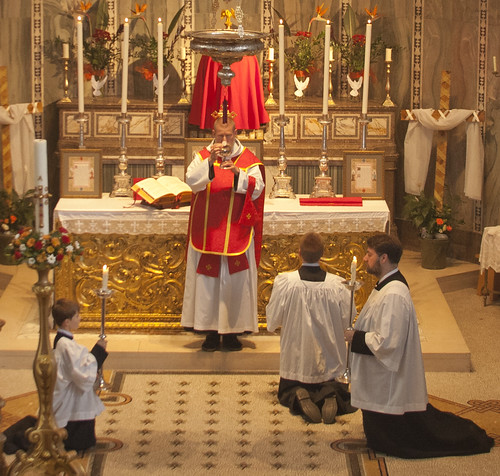 |
| Photos: from Prior Cassian Folsom's Mass in London last Saturday. More here. |
Support the work of the LMS by becoming an 'Anniversary Supporter'.
Clericalism and Clericalisation
 |
| Not a specifically clerical role. |
Some time ago I criticised the views of Russell Shaw (no relation) on the subject of clericalism and caesaropapism. He appeared to think, in his book To Hunt, To Shoot, To Entertain, that cases of caesaropapism, such as the Emperor Constantine regarding himself as holding ultimate authority over doctrinal matters, are actully cases of its opposite, clericalism: clericalism being the arrogation of lay authority by the clergy.
I have been thinking since then about the notion of 'clericalisation of the laity'. This term was popularised by Pope St John Paul II; it is used in Christifideles laici (1988: 23), but the most explicit discussion I have found is, for some reason, an address to the Bishops of the Antilles in 2002. As he explained, it
What the laity do in the way of 'ministries' in the liturgy, and in doing things like parish catechism classes, they do by subsitution for clerics. This is not always bad: it is sometimes necessary for the worthy celebration of the liturgy, given the non-infinite resources of parish churches. Where clerical acolytes and clerical scholas aren't available, which is to say everywhere outside seminaries, lay people are routinely used even in the context of the Traditional Mass. The artificial creation of reasons to use lay people where clerics are available, by contrast, is condemned by Christifideles laici:
It is also necessary that Pastors guard against a facile yet abusive recourse to a presumed "situation of emergency" or to "supply by necessity", where objectively this does not exist or where alternative possibilities could exist through better pastoral planning.
The classic examaple is when the priest celebrant goes and sits down while his minions distribute Holy Communion. The principle would seem to extend to lay people reading the Epistle while the priest is present, though obviously this is a less serious issue. For in all cases of lay liturgical ministry, the purpose of the ministry is the worthy celebration of the liturgy, not the participation of the handful of lay people involved, and the motivation for getting lay people involved where this is not necessary would seem to be a clericalising clericalism. Again, Christifideles laici condemns:
the confusion and the equating of the common priesthood and the ministerial priesthood, the lack of observance of ecclesiastical laws and norms, the arbitrary interpretation of the concept of "supply", the tendency towards a "clericalization" of the lay faithful and the risk of creating, in reality, an ecclesial structure of parallel service to that founded on the Sacrament of Orders.
When all is said and done, why would the laity want to do the jobs of clerics, by substitution, when they can do the jobs proper to their lay state instead, unless they are convinced of the clericalist idea that only clergy are important, that clergy are the Church's elite, with the power and prestige? It is not clericalism which wants to see clerical roles done by clerics, and lay roles done by laity, if we have a proper appreciation of the lay role.
But here is something important. When the laity act as substitute clerics, they must do so under clerical authority and direction. By making oneself a pseudo-cleric, one enters the clerical hierarchy, and one does so as the very lowest of the low. But when the laity perform their proper, lay, role, in the family, in the world of work, in politics, they do so with autonomy. This is the teaching of Vatican II (Aposticalam actuositatem: 24), and it would have been a familiar idea to Catholic fathers, merchants, and kings throughout history.
Beyond the liturgy, there are in fact a range of roles for the laity, with a range of relationships with the hierarchy. It is the role of the hierarchy to teach and judge on doctrinal and moral issues, so their 'mandate' is needed for lay people who are taking part in matters closely related to this 'apostolic' work. Again, everything done in the temporal sphere is subject to moral appraisal by the clergy. But the work of parents, the owners and managers of businesses, and statesmen, to build up the Kingdom of God is not just a matter of applying moral judgements: it is a matter of the prudential judgements which the graces of their own states of life, and their experience and training, enable them to make. Clerics without the grace of sacramental marriage, without business or political experience or training, are generally well aware of their limitiations in these fields. It is another manifestation of liberal clericalsim that liberal Catholics are constantly trying to get priests, bishops, and other hierarchs to pronounce on such matters to forward their own agenda.
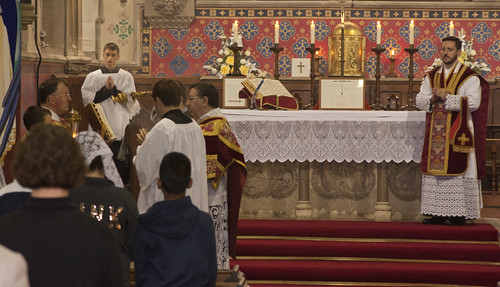 |
| The proclamation of the Gospel: this is a specifically clerical role. |
Support the work of the LMS by becoming an 'Anniversary Supporter'.
Female deacons: why not?
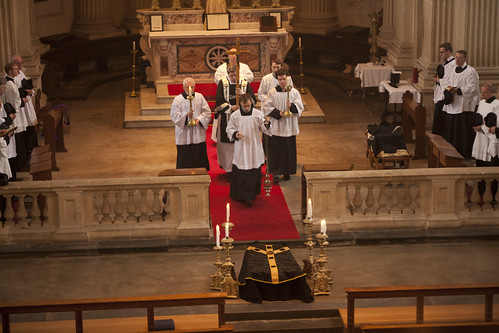 |
| A male-dominated sanctuary at the LMS Priest Training Conference at Prior Park. |
It is often pointed out that there are women described as 'deacons' in the early Church. Indeed, they continued to exist in the East into the 9th century. It's all there in the Catholic Encyclopedia.
This shouldn't be alarming, however, once a few pertient facts are remembered. These ladies were not ordained into the order of deacon: it was a non-sacramental ministry with distinct functions from that of ordained deacons. They would, for example, assist women who were being baptised when this meant full immersion. They ceased to exist because their special functions, like the one just mentioned, ceased to be necessary, after a period in which it it had been just an honorary role. There is no reason to imagine they existed in the primitive Church in a formalised way: there is no reference to them in Acts or St Paul's letters, though naturally women worked for the Church in all sorts of ways, by contrast with the order of (male) deacons, who were clearly quite significant.
This role could in principle be revived, as Pope Paul VI revived (or tried to revive) various other roles, like Lector and Acolyte, which had become simply steps on the way to ordination to the priesthood, and the permanent diaconate. It wouldn't be so easy to revive the things which they used to do, but maybe they could do something else. After all, women do all kinds of things in the Church.
One powerful reason against such an act of archaeologism is that it would be misunderstood. The ordination of female deacons was a major step towards having women priests in the Anglican Communion, and however much it was explained that this was different, it would create the impression that we were going down the same road, and create not only confusion but frustration and anger among the women who want to see the role of deacon as just such a stepping-stone to sacramental ordination. I have no doubt that this kind of argument will be sufficient to kill off the propsal in Rome.
Another reason is that giving out permanent ministries to the laity, instituted by special blessings or even, in the case of permanent deacons, by sacramental ordination, carries with it a huge danger of clericalisation. I should concede that at least some of the roles are perfectly real; having people trained and ready to perform them is genuinly a service to the Church; and having a blessing or formal induction can hardly be a bad thing in itself. Nevertheless, the multiplication of these ministries tends to embed the idea that involvement in 'the Church' is involvement as a cleric or quasi-cleric. It reinforces the unfortunate idea that it is only clerics who have real power and prestige in the Church, and that to get a slice of the action you need to become a cleric too. Thus, if women are to be given power in the Church, they must at least become quasi-clerics.
This is a disastrous road to go down, because far from undermining clericalism, it reinforces it, and buries still more deeply the reality of the separate, important, and dignified role of the laity. The laity, whether male or female, don't need to inducted into some footling role in the parish as the priest's little helpers in order to have something to do for the Kingdom of God. As Vatican II taught with great emphasis, our work for the Church is principally in the world, not in the liturgy or the parish office.
Apostolicam actuositatem 7:
The laity must take up the restoration of the temporal order [ordo temporalis] as their own special task. Led by the light of the Gospel and the mind of the Church and motivated by Christian charity, they must act directly and in a definite way in the temporal sphere.
The connection between the liturgical role of acolyte - server - and the priesthood has been the subject of a great deal of discussion: see this blog here.
Maria Montessori, children, and the Liturgical Reform
 I've been reading The Child in the Church by Maria Montessori 'and others'; it is a collection of different bits of writing from Montessori and some of her followers on religious education.
I've been reading The Child in the Church by Maria Montessori 'and others'; it is a collection of different bits of writing from Montessori and some of her followers on religious education.
Some people will be surprised to hear that Montessori was a Catholic. She was, and a very devout one. She had great affection and reverence for the rituals of the Church, and makes reference to such obscure things as the beautiful blessing of bells found in the Roman Ritual. She regarded religious instruction as so important that she wanted - as an ideal - an entirely separate school-room devoted to it, filled with displays and the manipulable aids to learning which characterise her movement, about every aspect of the Church's history, art, and liturgy.
She died in 1952, and her references to the liturgy and the way children could be inducted into it are redolent of the Liturgical Movement of her era. A revealing footnote in the 1965 edition of The Child in the Church which I have explains how the exciting reforms being planned by Vatican II are going to make things much better from a Montessori point of view. It is fascinating to see why the editor imagined that, how people influenced by Montessori took things forward, and also how things went wrong.
I need to take a step back, however, to explain how the Montessori 'method' applies to the liturgy. The leading idea of the Montessori philosophy is that children should be allowed to learn things in their own time and in a way appropriate to their age. Instead of waiting till the child is seven and then teaching the child in the propositional way of the classical catechisms, which they can begin to grasp only at that age, Montessori points out that much younger children can learn, but in a non-intellectual manner. This is, of course, obvious: they learn to walk and talk, use a knife and fork, and all kinds of things, with great rapidity and tenacity, and, as she points out, without the 'fatigue' of the school room.
Montessori wants to make place children in the conditions best suited to their spontaneous early learning, so it can be as effective as possible. Indeed, failing to do this she likens to failing to give children the food, clothing, and fresh air necessary to their physical development. She saw children playing with bricks and absorbed by illustrated books, so she and her followers surround small children with educational bits and bobs to manipulate and look at. Visitors to Montessori-influenced home-schoolers can find it difficult to find a place to sit down, or space on a table to put a mug of tea, not occupied by cunningly-conceived objects designed to illustrate mathematical relationships or stimulate the imagination.
I should emphasise that I've nothing against this stuff, and indeed the inflence of this kind of thinking is so pervasive that no house in the developed world with a small child is entirely free of it. My only qualification would be that, in my personal experience, its effectiveness is not exactly magical, and children differ in their preferred learning methods more than Montessori seems to have realised. But that's not to my present purpose.
Motessori's point is that children should be assisted in learning. The process is (to use modern terms) 'child led', but it is not that the children are left to fend for themselves, and it is far from being the case that Montessori had no substantive educational goals. It might shock her secular modern followers to read her saying (p54):
It is our duty as parents and teachers to pass on to the next generation the "Deposit of Faith" which has been handed down through the centuries by the Church. Our problem therefore is not so much a questions of what to teach but of how and when.
But say it she did. The 'child led' stuff is simply a technique for getting the target information into the childish mind as effectively as possible.
The progressives will be more reassured to read her saying that adults can be obstacles to learning, and over-zealous and misguided teachers are worse than useless. Indeed, her 'golden maxim' is: "Every usesless aid arrests development". The reason is that the cack-handed adult can get in the way of the child's fruiful personal engagement with something.
Here's another Montessor quotation, from a different book (The Child, Society and the World: Unpublished Speeches and Writings, p16):
The fundamental help in development, especially with little children of three years of age, is not to interfere. Interference stops activity and stops concentration.
This Scylla and Charybdis problem takes on a particularly acute form in the liturgy. Montessori notes that children are fascinated by things like liturgical colours, and the statues and art in traditionally-decorated churches. Again, she tells us that they can take a very keen and exacting interest in ritual. The Scylla of innapropriate guidance would have us navigate in the direction of leaving children alone in this environment: answering their questions, of course, but certainly not interuppting their prayers. On the contrary, however, Montessori seems worried only by the Charybdis of neglect. Taking her successful experiements with allowing small children to manipulate things, she makes an astonishing assertion - particularly astonishing, when applied to the the liturgy (p59):
Everyone knows that, unless children are asleep or inhibited, they are always in motion. What is there special about the kind of activity which accompanies the operation of the absorbant mind? ... it must be a form of what we call "synthetic activity", that is movement which brings into full co-operation the two main elements of the child's personality--mind and body--the intelligent, directing will on the one hand, and the co-operation of the voluntary muscular system on the other.
What does this look like in Mass? (p60)
... such actions as making the Sign of the Cross, with or without holy water, genuflecting, kneeling down and standing up during a service, carrying lighted candles without spilling grease, placing flowers at the foot of a statue and so on.
The possibilities for this in the traditional Mass are fairly limited, but they were being expanded at the time she was writing, and among her examples is the experimental practice of laity bringing up the gifts at the Offertory. It is surely not a coincidence that the reformed Mass held all sorts of additional opportunities for 'synthetic activity'.
The introduction of rehearsed 'synthetic activities' into the Mass is particularly surprising given Montessori's emphasis in another work, her The Mass Explained to Children, that children must not be instructed during Mass (p3), as happened in her experience.
Even at the Consecration, during those moments of silence and recollection, one hears the voice of the zealous teacher raised--more often than not an unmusical and expressionless voice--droning out explanations, as though fulfilling a dry duty. The less over, a shart "Sit up!" shoots all thoese young bodies upright again, and in those children--with the best intentions in the world--every spiritual impulse is thus stifled.
The first edition of The Child in the Church was published in 1929; The Mass Explained to Children appeared in 1933; these two positions must be taken together, in tension, as part of the Montessori outlook. It was the stress on 'synthetic activity' which went on to be influential in the movement to establish special 'children's liturgies' and efforts to stop Mass being 'boring' which followed the Second Vatican Council.
 Montessori has much to say about how we should let children wander about on their own and look at flowers and get out the educational toys of their choosing. Perhaps this 'free range' learning is even a bit over the top. It is doubly surprising, then, that we find in this essay in The Child in the Church an extension to the liturgy of her observations about children running their fingers over geometrical study aids, and the like, as if children had no capacity for silent and still contemplation. The reality is that young children can stand or sit transfixed with fascination looking at a sheep in a field, at a workman putting up shelves, or at a beautiful painting, long after the adults would have preferred to carry on with the walk, gone for a cup of tea, or moved on to the next room in the art gallery.
Montessori has much to say about how we should let children wander about on their own and look at flowers and get out the educational toys of their choosing. Perhaps this 'free range' learning is even a bit over the top. It is doubly surprising, then, that we find in this essay in The Child in the Church an extension to the liturgy of her observations about children running their fingers over geometrical study aids, and the like, as if children had no capacity for silent and still contemplation. The reality is that young children can stand or sit transfixed with fascination looking at a sheep in a field, at a workman putting up shelves, or at a beautiful painting, long after the adults would have preferred to carry on with the walk, gone for a cup of tea, or moved on to the next room in the art gallery.
In my next post I will say something about the chickens which came home to roost from these ideas, in the form of the 1973 Directory for Masses with Children from the Congregation of Divine Worship, signed by Cardinal Villot and Annibale Bugnini.
Just to whet your appetite, Michael Davies remarked of this document that it was the most disgraceful ever to emerge from a Sacred Congregation.
Support the work of the LMS by becoming an 'Anniversary Supporter'.
New Mass of Ages available in parishes this weekend
 Members should have received their copies by now, and it should be in parishes this weekend. See details and order a one-off copy through the website here.
Members should have received their copies by now, and it should be in parishes this weekend. See details and order a one-off copy through the website here.
Some of the contents:
Support the work of the LMS by becoming an 'Anniversary Supporter'.

